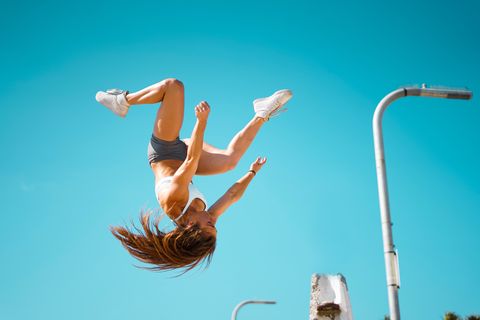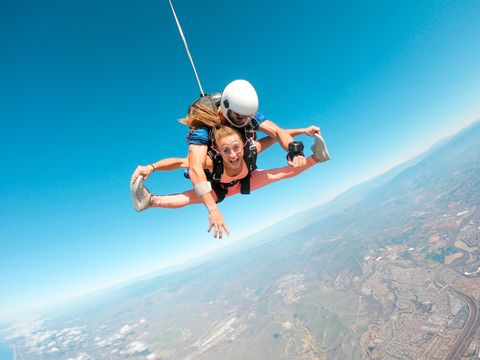This Self-Taught Teenage Tumbler Is One of Instagram's Most Dynamic Athletes
Earlier this year, when Demi Bagby asked me what we’d be doing during her interview, I considered lying.
Along with her almost 2 million Instagram followers, I’d seen the San Diego-based teenager master every activity I could think of—from tumbling to wakeskating to throwing footballs—and though I doubted there was anything she hadn’t yet tried, I wanted to see how she’d handle an unfamiliar movement. Eventually, though, I told her we’d be meeting at a batting cage. “Sounds great!” she texted. “I’ve never done that before.”
When I walked in the door of the cages, Bagby, who’s a half inch under five-feet, sprung up from her seat, smiled, and extended her hand. A facility manager directed us to the 45-55 mile-per-hour cage, since I’m not quite a slugger myself (the last time I hit a baseball was before Bagby was born). Helmet on, she walked through the chain-link door, tapped her bat on the ground, and looked back at me. “Do I stand on the plate?” she asked.
The first pitch came, and Bagby lurched forward and swung. She missed. “Oh my God,” she laughed. “I have no coordination at all.” After thinking for a second, she took a step back. On the next pitch, she connected and smacked a line drive.
As we picked up the balls, Bagby explained that, even though she’s now most famous for acrobatics, like full-split handstands and backflip wallballs, her first sport was soccer, since her brothers played and her dad coached. Her family was just as supportive when, in sixth grade, she told them she wanted to join a competitive cheerleading squad with her friends. The only problem was that Bagby had no experience, and her friends were in the intermediate level.
Everyone goes left, but I was like, ‘I’m gonna go right and be different.’
The cheerleading gym agreed to let Bagby take the more advanced class—but only if she learned the required skills before their first competition. “It was something like a back handspring and a back walkover,” she said. “Super easy skills looking back, but at the time, I was like, ‘There’s no way.’” For extra help, Bagby convinced her mom to sign her up for private lessons, but she still didn’t feel confident. “I never wanted to go into the gym and try something because all these people already knew what they’re doing, and I’m just hucking skills with no form.”
So, Bagby started training herself at home instead. “I’d take these rectangular cushions from outside by our pool and put them in the living room and start flipping,” she said. “That’s where I did my first ever backflip.” After that, she started teaching herself a backflip with a full twist. “I had no idea how to rotate,” she said. “I didn’t know whether to go left or right, so I chose right. Everyone goes left, but I was like, ‘I’m gonna go right and be different.’” Within a few months, she’d progressed to the highest level at the gym, a rate of improvement her coaches had never seen before.

demibagby
Once we were done hitting, Bagby told me about her last day at cheerleading practice. She was thrown into the air for a basket toss and was dropped on the way down, breaking her back upon impact. When I asked her which trick it was or if she lost consciousness, she shook her head. “We should probably move on,” she said. “I’m sorry. It’s a really emotional thing, and I think that’s also a big part of why I do individual sports, because I know my limits and don’t have to rely on anyone else.”
It took about a year for Bagby to recover fully, during which she read and taught herself the piano. She also learned a new level of pain tolerance (“Unless I die, nothing’s ever gonna hurt that much”) and discovered a foundation of patience that I had a hard time believing at first—she was so full of movement. Even in a chair, Bagby was constantly gesturing with her hands and shifting her weight, which made more sense when she told me that sitting for long stretches hurts her back. I suggested we take a walk on the beach.
As Bagby drove us there, she adjusted herself in the seat, which relieves some of the pressure on her spine. However, there’s little she can do for long plane rides, like the trip to Sydney she would take the following week, except to stretch beforehand. “I do the splits in the middle of the airport,” she said, “and then I throw a couple flips in there to get some energy out.”
At the beach, in between strangers stopping Bagby to ask for photos, she explained how she moved on from her injury. She was driving with her mom and saw a sign for CrossFit, and she needed to check it out. “I walk in, and it’s a little gym with black mats, some pullup bars, and an open floor, and I’m like ‘Wow, this is crazy.’ It just looked so cool. Like, this open space means you do something here.” When she joined, she was 14 years old and the only non-adult at the gym.
CrossFit was the perfect sport for Bagby because she could lift light on the barbell movements, like squats and deadlifts, and then go whole hog on the gymnastics and conditioning, which was what she loved most about cheerleading. Shortly after she began, she entered the teen competition at the CrossFit Open. She placed 517th in the United States for 14 to 15 year-old girls. The following year, she was 23rd in the world.
Since then, Bagby’s added to her long resume of activities. After cheerleading, parkour, and gymnastics (which she calls “air awareness sports”), she moved on to board sports, like ocean surfing, wake surfing, snowboarding, and skateboarding. The one consistent factor is that Bagby has always taught herself. “I’ll do something and know that it’s not right,” she said, “or I’ll get hurt and be like, ‘I know what I did. I need to never do that again,’ rather than someone saying, ‘Don’t do that.’”
In that regard, Instagram is essential to Bagby’s development. “It’s a journal of my skills,” she says. “I can watch myself surfing and say, ‘I know what feeling I had when I was carving, and this is what it looks like.” That may sound like a trivial thing, especially in comparison to all the other benefits of social media fame, but it sounds sincere coming from Bagby.
People don’t really realize how much sports correlate to each other until they try them or see them.
Toward the end of our day together, I realized that Bagby hadn’t looked at her phone once. That’s an impressive feat for anyone these days, let alone someone whose career is so intertwined with social media. In fact, she barely talked about her Instagram at all. When it eventually came up, she told me, “In a work environment or at an event with people doing what I do, I’m like, ‘Hey, this is who I am. I’d love to work with you.’ But when I’m just meeting someone, it’s more genuine when I’m not like, ‘Hey, I do Instagram. I have a million followers.’ Then, they get to see me for me, rather than how the internet sees me.”
How most people see Bagby is as a superhuman—which is in no small part due to her age, perhaps, the most remarkable thing about her wide range of physical capabilities. But until this year, it was also her most limiting factor (Bagby only turned 18 in January). As a minor, she needed a chaperone to travel abroad, and there were several photoshoots where the organizers, having assumed she was already an adult, made her sit outside when they discovered otherwise. “I honestly almost got a fake ID just so I could go to the gym,” she says.
Every time someone messaged Bagby with an opportunity that she needed to be 18 to accept, she put it in a special folder, which filled up with dozens of offers. She was at least able to learn while recovering from her back injury, so she was less positive about being a minor. “If I didn’t have a skill,” she told me, “I could work my ass off until I got it, but this [her age] is the one thing I can’t change.”

Demi Bagby
Bagby went skydiving when she turned 18, and for her next birthday, in January 2020, she plans to release a fitness app, with three-month programs aimed to help users expand their fitness horizons. “No matter who you are at the gym, you have something that makes you comfortable, and you also have something that challenges you,” she said. “So, I have machines, I have more functional training, I have weight-based training. There’s also lateral and unilateral movement, so a lot of things that correlate with parkour as well as surfing and skating, too.”
Eventually, Bagby said the app will include more sport-specific training, but her main goal is to help athletes build a more diverse skillset. “People don’t really realize how much sports correlate to each other until they try them or see them.”
The format is fitting. Ever since Bagby dragged those rectangular mats from her pool into her living room and started flipping, she’s committed to both finding those movement similarities and to doing so through her own experience. It’s not the easiest or most efficient route, but, based on Bagby’s remarkable breadth, it’s one that can be extremely successful.
Source: Read Full Article


